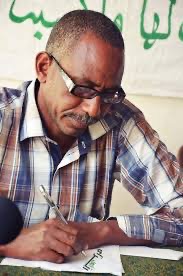Titles: Alsir Alsayed

Note:
These articles aim nothing more than to raise questions and incite research, so they are often sparse in detail.
Theatrical groups and groups in Sudan:
In two previous articles, I have discussed the reasons for establishing theater groups and groups in Sudan and the reasons for their cessation and collapse.
In this article, I will discuss their names and the impact they left on our theatrical experiences.
The names of teams and groups:
Many Sudanese theatrical groups and groups have various names that carry a lot of deep connotations and beautiful timbres. Some of them took the names of famous people, cities, and institutions, such as the “Al-Fadil Saeed” group, the “Omdurman Theater Group,” the “Sea Ports” group, and the “University Theater” group, and some of them took names with a lot of meaning. Political symbolism, such as the “Azza” group and “Alard” group, some of which took names related to the theatrical dictionary, such as the “Experimental Theater” group, the “Continuing Workshop for the Development of Performing Arts”, the “Theatrical Traveling Workshop”, the “Shouf Theater” group, and the “Sudan Acting and Music” group, some of which took the name of a theatrical performance presented by the group or troupe, such as the “Al-Sadeem Theatrical” group (Al-Sadeem). It is a theatrical text produced by the group and written by the poet Adonis, and some of it was taken as the name of well-known Arab theatrical groups, such as the “Adwa Almasrah” troupe and the “Free Theater” troupe.
Of course, there are many names, and what I mentioned came as an example but not limited to them.
Impact and addition
As for the impact and addition made by the theater groups and groups, it can be noted:
1- The phenomenon of teams and groups, despite everything, is in itself a healthy phenomenon. It, in a way, indicates the penetration of the theatrical phenomenon into the lives of Sudanese. It also indicates, on the other hand, and indirectly, the contribution of theater in establishing a culture of collective work.
2- Despite the insufficiency and neglect of the state that these groups and groups suffered, the greatest brilliance of theatrical life in Sudan came from them and was because of them. It is enough to take a look at the history of theatrical performance to touch and stand on what they presented.
3- These groups and groups constituted the only source of income for many playwrights and were their means of a decent life. We mention here, for example, the “Friends” and “Al-Fadil Saeed” groups.
4- These groups and groups, especially those that played important roles and stopped, revealed the intentional and organized neglect that the theater suffers from the state, represented by the Ministry of Culture and the official theater institution.
5- The absence of organizational and administrative awareness, as one of the strongest reasons for the decline and cessation of groups, revealed the need of our theatrical movement for this culture and this dimension. There is no creativity without management and organization. If this awareness existed, it would be possible for these groups and groups to search for other sources of funding and manage many of their differences through institutions and democratic dialogue instead of divisions and fragmentation.



